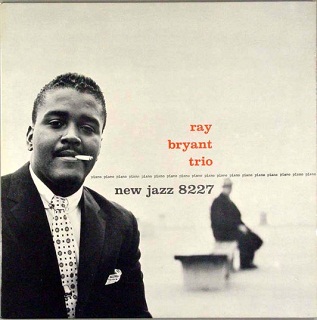This was a hot time for Ray Bryant. And actually, come to think of it, he never cooled off over a long and productive career: over 60 albums as leader, including a few solo piano albums, and a Music Minus One, which is something I'd quite forgotten about. Music Minus One was a series of albums of classic jazz tunes with the part for the main soloist left out, as a practice tool for musicians. So I remembered. It turns out that (a) Music Minus One was really started for classical musicians, although they did jazz too, and (b) they're still around, with close to 900 titles in print, and with the kid who founded it, now nearly 90, still running the company. Good for Irv Kratka, and good for Music Minus One. Good for anything that encourages people to play music, and helps them to play music.
But I digress. Ray Bryant gave us over 60 albums as leader, gigs as sideman numbering in the hundreds. He had a huge pop hit in 1959 with "Madison Time," which became even huger in 1988 when it was used for a key scene in John Waters' Hairspray. He composed several other tunes that have become jazz standards.
He had burst onto the New York recording scene in 1954, with an album for Columbia entitled Meet Betty Carter and Ray Bryant. It was the debut album for both of them, but when a vocalist is one of the people you're meeting on vinyl, it's really the vocalist's session.
He was still living in Philadelphia until well into the 1950s, playing regularly at a club there, and commuting to New York for recording sessions with various artists, including three on Prestige. He cut his first album as a leader (also a trio session) for Epic in 1956, and this was his second. He would shortly make the move that a serious jazz musician had to make, to the Big Apple.
Backing him up this session were Ike Isaacs on bass and Charles "Specs" Wright on drums, both new to Prestige but not new to Bryant. Earlier in the year he had worked with Wright on an Art Blakey date, and then with both of them on two sessions with Carmen McRae (Isaacs was then Mr. Carmen McRae), so they had a good groove going.
As talented a composer as Bryant came to be, for this early session he relied mostly on tunes from an eclectic assortment of composers.
The session leads off with John Lewis's almost painfully beautiful "Django," and the song leads off with a slow, stately reading of the melody, with a lot of sustain, that leaves you holding your breath, wanting to hold onto the moment, and waiting to see what will come next. When he picks up the tempo and loses the sustain, the haunting quality of the head stays with you.
As is often the case, the order of the session is changed on the album, which leads off with "Golden Earrings," by Victor Young one of those enduring tunes from a forgotten movie (like "Unchained Melody"). He also covers Tin Pan Alley journeymen Ray Henderson and Matt Dennis, and jazz greats Clifford Brown ("Daahoud") and Kenny Clarke/Gerald Wiggins ("Sonar"). The two originals are "Blues Changes" -- and there's some blues in everything Bryant plays -- and "Splittn'," in which the tempo burns and the lead is split between Bryant's piano and Wright's drums
The album was released on both Prestige and New Jazz, same cover art for each release, and although it's called Piano Piano Piano Piano in some catalogs, on the record the title is just Ray Bryant Trio,

Order Listening to Prestige, Vol. 1 here.


No comments:
Post a Comment